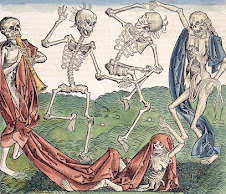Subscribe to:
Post Comments (Atom)
skip to main |
skip to sidebar
This is blog for students of History 102g - Medieval Civilization
Discussion Section Syllabus
History 102g, Medieval Civilization Discussion Section Syllabus
Fridays 9am, 12pm
TAs: Stacey Lutkoski & Ericka Swensson
Email: staceybl@usc.edu, emswensson@yahoo.com
Office: Shrine Offices
Welcome to the discussion section for History 102g. Discussion sections will examine and elaborate on the material presented through the lectures and readings. These classes will help us work through difficult concepts and problematize historical issues. As stated in the course syllabus, the discussion sections are worth 20% of your total course grade. Half of your discussion section grade will be determined by performance in the section itself. In order to receive full credit you need to be present at every class with the readings in hand, be an active participant, and demonstrate a familiarity with the sources.
Cell phone calls, tardiness, inappropriate use of laptops, and other disruptive behavior will not be tolerated and will adversely affect your grade.
Attendance is mandatory. Consult the course syllabus for more information on the attendance policy and penalties.
The second half of your discussion section grade will depend upon your performance in our class blog. Please email Ericka if you have not yet been added to the blog. This is your responsibility, and we will not be held responsible for your negligence. Each week we will post an assignment by Monday evening. You must post a thoughtful paragraph response on the blog by Thursday at 8pm. Late postings will not be accepted. We encourage you to use the blog not only as a place to express your ideas but also as a discussion forum by responding to your classmates’ postings. Your post should neither be a “fact” oriented question/ comment nor a question concerning the content of the works themselves, i.e.: a question that requires outside sources to answer. Rather, your response statement should deal exclusively with the contents of the texts themselves. Also, make sure that you cite the page(s) used for your question or comment.
This syllabus is subject to change. We will communicate with you outside of class primarily through email, and it is your responsibility to check your account regularly for pertinent information. If you have any questions or concerns, feel free to contact either one of us.
Any student requiring academic accommodations based on a disability is required to register with Disability Services and Programs (DSP) each semester. A letter of verification for approved accommodations can be obtained by DSP. Please be sure the letter is delivered to us as early in the semester as possible. DSP is located in STU 301 and is open 8:30am-5:00pm Monday through Friday. The phone number for DSP is (213) 740-0776.
2 comments:
Hello: As you may remember I have a certain fascination with "What does it mean to be a Bishop in the 5th Century". Actually my fascination is with the acquisition of power - but I digress. I was moved by a quote by King Chiperic pg 380 Bk 6 " There was nothing that he hated so much as he hated the churches. He was perpetually heard to say: My treasury is always empty. All our wealth has fallen into the hands of the Church. There is no one with any power left except the Bishops." BUT...... on pg 340 BK 6 we see Bisop Domnolus get deathly sick and "he was seriouly ill with jaundice and stone in the kidneys and he chose Abbot Thedulf as his successor. The King (Lothar)agreed to this, but later on he changed his mind". HE CHANGED HIS MIND!!!! Geeeezzz! But the best for me pg 346 Bk - is Gregory refusing to go along with a dying Bishops request to have Burgundio succeed him as Bishop - Gregory writes his rebuttal for his refusal by saying "It is set out here in the canons, my dear boy, until he has first gone through the various ranks of the church in the normal way". Yea right! You could become a Bishop by being a Circus Clown ( a little joke) or a Count - had a uncle - had enough money - lived in the right kingdom - was the priest to a dying Bishop - or was a very large kiss-ass! A special example of the Bishop's life expectacy is on pg 367 BK6 - "He conspired with an archdeacon of Lisieux and together they plotted their Bishops death, the priest having the gall to see himself as a possible replacement." And the hits just keep on coming. Devotion to God seems to have so little effect on ones ascendacy to a Bishopric - Gregory gives so many examples of piety, but the Bishops are such a disfunctional group. But I will give Gregory a pat on the back - I think Gregory agrees with me concenring the lunacy of his times - pg 370 Bk6 - "Theodosius, Bishop of Rodez, died. He had been the successor to St Dalmatius. The LOBBYING and SCANDALOUS rivalies which ensued for the bishopric of this diocese reached such a pitch that it was stripped of its sacred vessels and it's more important possessions." Thanks for listening - Best Wishes Rick
Why are most of our primary source texts by bishops and/or of bishops? I can understand that it might be easier for bishops to write and publish a text because they were educated so, but as in our reading hints at, there are other educated people that are not bishops. I would be very interested to see if there are any surviving manuscripts by someone like an Arian rhetoric or a Jewish person, to get a different perspective on their time. I personally find it very hard to analyze the societal norms and institutions objectively if the text is already biased with the bishops' spin on the story.
Post a Comment